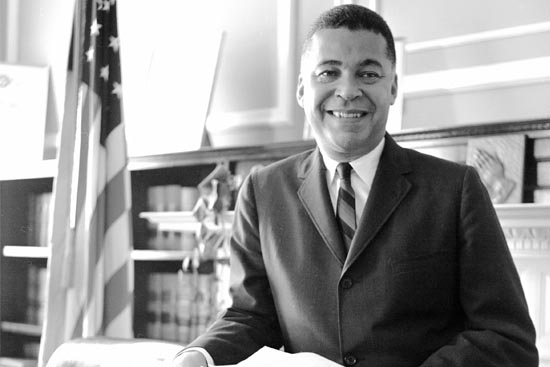Remembering a Pioneering Politician
Alum Edward Brooke, first black US senator since Reconstruction, has died

BU alumnus Edward Brooke, who died January 3, poses as Massachusetts’s attorney general in 1963. Photo by BU Photography
“I never studied much at Howard [University], but at Boston University, I didn’t do much else but study.”
Far from resenting BU’s School of Law for that break-neck work schedule, Edward W. Brooke (LAW’48, Hon.’68) relished his time on Comm Ave. Brooke, who died January 3 at the age of 95, was the first popularly elected African American US senator. He maintained a close relationship with Boston University and gave a donation to name the Public Interest Law Student Journal Office in the newly renovated LAW tower.
A decade ago, at a ceremony celebrating the donation of his papers to the University’s Howard Gotlieb Archival Research Center, Brooke gave his alma mater a shout-out for its devotion to public service. LAW Dean Maureen O’Rourke recalled the moment on her blog the day Brooke died:
“I was the Interim Dean then and sat in the back, awed by the occasion and his presence. Imagine my shock when in the middle of his speech, he recognized me after reading an article in the [Boston] Globe about BU Law’s increasing its loan repayment assistance endowment by $500,000. He emphasized the importance of public service and was proud of his alma mater’s legacy and ongoing commitment.”
The future dean befriended the former senator and attended the 2009 ceremony at which President Obama presented Brooke the Congressional Gold Medal. (Five years earlier, he’d received the Presidential Medal of Freedom, the country’s highest civilian honor.)
“I loved visiting the Senator and his wife Anne at their home in Miami,” O’Rourke wrote. “It was humbling to see the memorabilia associated with a life of public service and to talk about current issues and hear the Senator’s perspective.”
Brooke’s “quiet and substantial generosity” to LAW reflected his “commitment to the public good,” says Scott Nichols, BU’s senior vice president for development and alumni relations. “He was inspirational in so many ways, including as a philanthropist.”
“He was very much like a fourth brother to me,” says Harriet Elam-Thomas, a career diplomat and former ambassador to Senegal. Two of her actual brothers were close to Brooke: Harry (LAW’51) knew him at BU, and Clarence served with Brooke in the Army during World War II in Italy.
“He called me every year on my birthday,” Elam-Thomas says. “He came to my wedding. He came to my swearing-in when I became ambassador.” Now 73, she recalls the sexism in the diplomatic corps—“Wearing a skirt in the Foreign Service was 10 times more difficult than being brown-skinned.”—but always got encouragement from her “big brothers,” a group that included Brooke.
“They pushed me to excel, and he was right there with them,” says Elam-Thomas. Brooke’s push included an intercession that helped her secure a job in 1968 on the transition team of incoming Republican president Richard Nixon.
BU was Washington, DC–born Brooke’s second exposure to Boston—he was stationed at Fort Devens as an infantryman before shipping overseas during World War II. After his time at LAW, where he edited the law review, he opened a law office in Roxbury. In 1962, the Republican Brooke was elected Massachusetts’s attorney general—the nation’s first black AG—an achievement, the Globe reported, that led fellow Bay Stater and then president John Kennedy to exclaim, “My God, that’s the biggest news in the country.”
Brooke parlayed his prosecution of corrupt politicians and his oversight of the hunt for the Boston Strangler into his landslide Senate victory in 1966. Serving two terms, he made his mark on civil rights legislation, sponsoring open housing and public housing rent cap laws. But a bitter divorce and the revelation that he’d made a false financial statement in a deposition related to it persuaded voters to replace him with Paul Tsongas in 1978.
After his defeat, Brooke joined a Washington, DC, law firm and bought a farm in Virginia, later moving to Florida.
“Senator Brooke was a transcendent figure in our state and in the nation,” BU President Robert A. Brown says. “He was first or in the vanguard in many things, but the firsts were not the full measure of his career and his impact as a legislator and attorney general. We are proud to claim this principled public servant and decorated veteran as an alumnus of Boston University’s School of Law and former member of our board of trustees. We are saddened at his death.”
Survivors include his wife, three children, a stepdaughter, and four grandchildren.
Comments & Discussion
Boston University moderates comments to facilitate an informed, substantive, civil conversation. Abusive, profane, self-promotional, misleading, incoherent or off-topic comments will be rejected. Moderators are staffed during regular business hours (EST) and can only accept comments written in English. Statistics or facts must include a citation or a link to the citation.